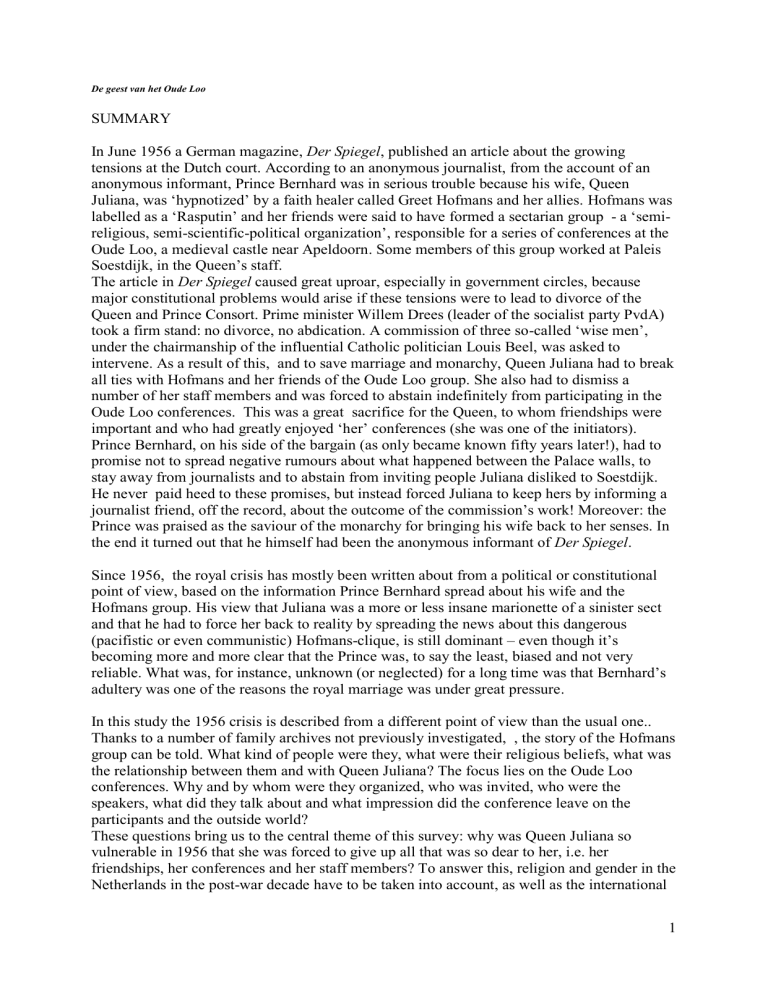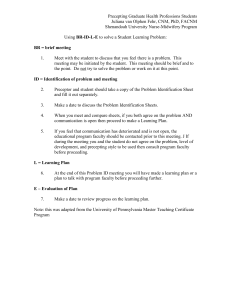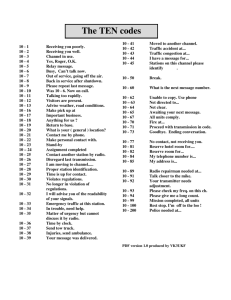1 SUMMARY In June 1956 a German magazine, Der Spiegel

De geest van het Oude Loo
SUMMARY
In June 1956 a German magazine, Der Spiegel , published an article about the growing tensions at the Dutch court. According to an anonymous journalist, from the account of an anonymous informant, Prince Bernhard was in serious trouble because his wife, Queen
Juliana, was ‘hypnotized’ by a faith healer called Greet Hofmans and her allies. Hofmans was labelled as a ‘Rasputin’ and her friends were said to have formed a sectarian group - a ‘semireligious, semi-scientific-political organization’, responsible for a series of conferences at the
Oude Loo, a medieval castle near Apeldoorn. Some members of this group worked at Paleis
Soestdijk, in the Queen’s staff.
The article in Der Spiegel caused great uproar, especially in government circles, because major constitutional problems would arise if these tensions were to lead to divorce of the
Queen and Prince Consort. Prime minister Willem Drees (leader of the socialist party PvdA) took a firm stand: no divorce, no abdication. A commission of three so-called ‘wise men’, under the chairmanship of the influential Catholic politician Louis Beel, was asked to intervene. As a result of this, and to save marriage and monarchy, Queen Juliana had to break all ties with Hofmans and her friends of the Oude Loo group. She also had to dismiss a number of her staff members and was forced to abstain indefinitely from participating in the
Oude Loo conferences. This was a great sacrifice for the Queen, to whom friendships were important and who had greatly enjoyed ‘her’ conferences (she was one of the initiators).
Prince Bernhard, on his side of the bargain (as only became known fifty years later!), had to promise not to spread negative rumours about what happened between the Palace walls, to stay away from journalists and to abstain from inviting people Juliana disliked to Soestdijk.
He never paid heed to these promises, but instead forced Juliana to keep hers by informing a journalist friend, off the record, about the outcome of the commission’s work! Moreover: the
Prince was praised as the saviour of the monarchy for bringing his wife back to her senses. In the end it turned out that he himself had been the anonymous informant of Der Spiegel .
Since 1956, the royal crisis has mostly been written about from a political or constitutional point of view, based on the information Prince Bernhard spread about his wife and the
Hofmans group. His view that Juliana was a more or less insane marionette of a sinister sect and that he had to force her back to reality by spreading the news about this dangerous
(pacifistic or even communistic) Hofmans-clique, is still dominant – even though it’s becoming more and more clear that the Prince was, to say the least, biased and not very reliable. What was, for instance, unknown (or neglected) for a long time was that Bernhard’s adultery was one of the reasons the royal marriage was under great pressure.
In this study the 1956 crisis is described from a different point of view than the usual one..
Thanks to a number of family archives not previously investigated, , the story of the Hofmans group can be told. What kind of people were they, what were their religious beliefs, what was the relationship between them and with Queen Juliana? The focus lies on the Oude Loo conferences. Why and by whom were they organized, who was invited, who were the speakers, what did they talk about and what impression did the conference leave on the participants and the outside world?
These questions bring us to the central theme of this survey: why was Queen Juliana so vulnerable in 1956 that she was forced to give up all that was so dear to her, i.e. her friendships, her conferences and her staff members? To answer this, religion and gender in the
Netherlands in the post-war decade have to be taken into account, as well as the international
1
situation, especially the Cold War and trans-Atlantic cooperation (for instance in the
Bilderberg conferences of which Prince Bernhard was the chairman).
As the archives showed, the conferences at the Oude Loo were strongly Christian in belief, although other religions (like Islam en Hinduism) were more than once the subject of discussion in Apeldoorn. The goal was to restore belief in the notion of ‘God founder of the world and therefore invincible’. That man had put himself in the centre instead of God, was seen as the cause of all trouble (and illness) in the world. The leading idea at the Oude Loo was that if every man and woman individually reinforced his or her relationship with the
Almighty, peace would be at hand. Everybody had to play his part in bringing about the so called ‘theocracy’: a vague future unknown to humankind in which God’s rule over the world was restored.
The Oude Loo conferences were the vehicle for spreading this idea from Holland to the rest of the world. The organizers considered themselves, in the words of Queen Juliana, as
‘privileged forerunners’ – thanks to the special gifts of Greet Hofmans, who was considered an intermediate between God and believers. She had direct contact with ‘the other side’ and could therefore give advice to anyone who wanted to put their future in the hands of God.
What people did with the messages Hofmans handed down, was their own business.
According to the Oude Loo group, churches and other man-made organizations and (political or religious) ideologies were only distracting people from the right, divine path and should therefore be avoided.
At the Oude Loo Juliana wanted to be a participant like any other – which of course she was not. The conferences had a special impact because of the fact that the Queen (and her mother as well sometimes) was involved in it, even though Juliana wanted no privileges. She participated enthusiastically in the discussions, and between the speeches she served drinks for the audience. Notwithstanding that, Hofmans and her friends saw the Queen as the figurehead of their religious movement. Because of her high position she was able to send the message of God to the world at large. During state visits and in her speeches at Christmas for instance she spoke words that the Hofmans group considered as being in accordance with their ideas – for ordinary listeners (like the Americans during the state visit in 1952) they were just ordinary Christian thoughts. At the same time Juliana was careful to keep a sharp distinction between her thoughts spoken in private and in public. Between the thick walls of the Oude Loo castle her words were more outspoken than when she was acting as a Queen.
The Hofmans group did not want to be considered as a sect, but as an informal community without strict rules. In the beginning, the rule was that participants were invited to Apeldoorn only once, in order to spread the word of God as widely as possible. But over time, a particular group of people emerged that visited the conferences more than once, and some of them even became regular attendees. What they had in common was that they were mostly non-churchgoing Christians who believed in Hofmans as a kind of biblical prophetess.
The problem was that the Oude Loo, and the group associated with it, were seen as suspect by outsiders. One of the reasons was the guru-like status of medium Hofmans. For example,
Eleanor Roosevelt (who attended the second Oude Loo-conference) stated ‘that it was almost arrogant to expect to establish with the Almighty a direct and conscious connection’. It was not only Der Spiegel that compared Hofmans with the faith healer Rasputin, the Russian monk who had held a firm grip on the Tsarist court after curing the youngest son of Tsar
Nicolas II.
Probably even more harmful to the reputation of the Oude Loo conferences was the personality of the main organizer, Wim Kaiser. He was the ideologist of the ‘theocratic’ Oude
Loo movement. For him the messages Hofmans handed down were holy obligations and had to be followed – just as he himself had done in 1948 by resigning from his job, giving up his
2
house and leading his wife and children into exodus to live a life in the service of the
Almighty.
This deed was highly praised by Queen Juliana and her mother Wilhelmina, who were impressed by Kaiser’s unconditional devotion to God. They also appreciated his frank way of speaking. Kaiser did not distinguish between royalty or, say, farmers or craftsmen: he just said what he had to say. And he mostly took a firm position: he rejected what he considered as compromises. To live up to God was hard and demanded what he called ‘vertical obedience’ or unconditional surrender to the word of the Almighty, as was shown by Abraham and Job in the Bible. The problem was that he lacked any kind of empathy, and his behaviour gave the conferences a bad reputation with quite a few people (Eleanor Roosevelt amongst them). The tragic thing about Kaiser is that he strongly believed he was doing something good for humankind; but he could not (under)stand individual humans.
The rumour that the Oude Loo group formed a kind of sect around medium Hofmans; their opposition to the (strong post-war) status of the established churches; and the way Kaiser behaved, not only gave the Oude Loo conferences a bad reputation, but also had a negative impact on Queen Juliana. Many politicians, journalists and clergymen had difficulties understanding what was going on in and around Apeldoorn and what Juliana was up to. She was believed to be out of control and out of her mind – even though there was hardly any problem between her and the governing socialist-Catholic coalition to fuel that claim.
What harmed Juliana was the negative way in which Prince Bernhard (mostly off the record) spoke about the Hofmans-clique. It seemed that the main problem Bernhard had with
Hofmans and the other friends of his wife, was not so much their religious beliefs as well the way they – as he saw it – interfered in his marriage and therefore threatened his way of life.
He strongly believed they pressed his wife to criticize his sexual behaviour (which indeed
Juliana’s friends and staff abhorred) and his involvement in the trans-Atlantic Bilderberg conferences (which Juliana indeed asked prime minister Drees to put an end to).
A huge problem for Juliana was that women in the post-war period were not taken seriously.
Once married, a woman was not allowed to work in public service, and was subordinate to her husband. This did not change in the Netherlands until 1956/1957, but until then Prince
Bernhard had every right to say (as he actually did!) that although his wife was the head of state, he was head of the household. This gender situation contributed strongly to the vulnerability of Juliana in 1956, because as a woman she had to deal with strong male opposition during the crisis.
Being a man, on the other hand, Bernhard held a strong position. He and the leading Dutch politicians of those days shared the same objective: a divorce had to be avoided: Bernhard because his life was built on being married to the Queen of the Netherlands; and Drees, Beel and others because they feared constitutional problems – abdication of the popular Juliana was the most likely outcome of a divorce and would no doubt have resulted in an electoral trouncing for the parties involved, first and foremost the PvdA. All this, plus the dynastic interests of her House, was too strong a force for Juliana to resist. She was unable to withstand the pressure put on her to give notice to certain members of her staff and
(temporarily as she believed for a time) to put an end to her friendship with Hofmans and the others and to abstain from visiting the Oude Loo conferences. For the Queen this was a tragic decision to take, more so because her friends refused to understand why she surrendered completely to the wishes of her husband and therewith forsook what she had held to be a holy mission in the service of God Almighty for some eight years.
3
More than thirty years later, in 1988, Juliana accidently met one of her old Oude Loo friends,
Rita van Heeckeren. They took up their old relationship, drank tea together from time to time and sent each other Christmas cards. After three years, this renewed friendship came to an end. Without explanation Juliana wrote that she was no longer able to see Rita or otherwise remain in contact with her. Rita and her husband Walraven (one of the staff members Juliana was forced to fire in 1956) supposed that Prince Bernhard was (again) the cause of this new farewell – which turned out to be a definitive one. Juliana died in 2004, not ever seeing her adored friend again, with whom she had shared a religious mission. A mission towards a better, peaceful world under the rule of God. A mission in which she had been very proud to participate.
4





